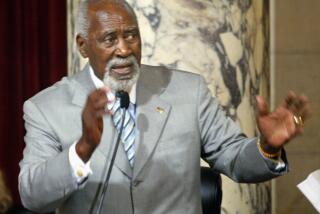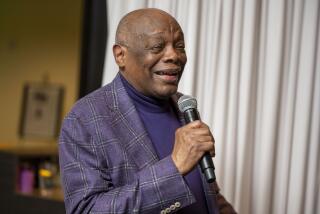Brown’s China trip may have dubious value for the state
SACRAMENTO — You know things are going splendidly for a governor when he can arrange a weeklong jaunt through China and not have to pay a cent himself — or even dip into the public till.
The fact that it’s sort of a 75th birthday bash for Gov. Jerry Brown and that the roughly 90 invitees — mostly special interests, but also some longtime chums — are willing to pay $10,000 each, plus trans-Pacific airfare, is particularly impressive.
Oh, OK, it’s a “trade and investment mission.”
Whatever it is, trip organizers were turning people away before departure, a sign of this governor’s continued smooth sailing politically.
A USC Dornsife/Los Angeles Times poll last month found that 49% of state voters approved of how Brown was handling his job, remarkably high considering the low esteem in which many politicians are held these days; only 37% disapproved.
But there’s just something out of focus about this China picture.
First, if the junket really is worth the governor’s time and energy — if the state actually does stand to benefit — then the state should be paying for it, not a bunch of special interests. That $10,000 “participation fee” for each attendee also covers costs for the governor and his 10 or so aides, according to trip organizers.
It just looks unseemly — a pack of lobbyists and other favor-seekers paying big bucks to traipse after the governor, schmoozing and gaining invaluable access.
However, organizers may have missed an opportunity. With a horde of 90, they could have sold tickets to watch the sharp elbows and body blocks by interests trying to cozy up to the oft-aloof governor.
Brown isn’t the first to finance foreign gallivanting with special interest money. Gov. Arnold Schwarzenegger also did.
Gov. George Deukmejian did not — not really. A few business interests would tag along briefly and host a lavish reception for foreign VIPs, but Duke would pay for his own costs with state money.
“Gov. Deukmejian strongly believed that these trips were of a very serious and important public purpose and part of his official duties to facilitate jobs for the state, and should be paid for at public expense,” says attorney Steve Merksamer, who was Deukmejian’s chief of staff.
“He thought it was inappropriate to use private money to pay for any of the public officials. He wanted to avoid any possible conflict with private interests.”
Deukmejian went on five foreign trips before departing Sacramento in 1991. Eventually, governors became too embarrassed — too weak-kneed — to ask the public to pay. Special interests were happy to.
Second, the photo-op highlight of these trips often is the establishment of a foreign outpost that invariably turns out to be of dubious value. Brown is scheduled to formally open a “California Trade and Investment Office” Friday in Shanghai.
“Historically, these foreign offices haven’t accomplished very much,” says a longtime critic, Jock O’Connell, a foreign trade expert for Beacon Economics. “Legislators and governors have mostly used them as political props.”
Brown’s father, Gov. Pat Brown, opened three — in Mexico City, Tokyo and Frankfurt. And his successor, Gov. Ronald Reagan, shuttered them, declaring that private enterprise could handle their missions better than government. Reagan had it right.
Deukmejian opened five offices and they proliferated under Govs. Pete Wilson and Gray Davis. Finally, amid budget deficits and scandal, the Legislature closed down 12 foreign offices in 2003. Many office directors were found to be grossly exaggerating — lying about — their accomplishments.
But the state kept open an office in Yerevan, Armenia, until 2008, principally because former state Sen. Jack Scott insisted on it. He was chairman of the influential Senate Education Committee — where many bills landed — and represented Glendale, home to a large Armenian American community.
“That country has an economy roughly the size of the Arden Fair mall,” O’Connell protested at the time, referring to a Sacramento shopping center.
On Tuesday, as Brown began his China trek, O’Connell e-mailed me: “What was it someone said? Those who do not remember the past are condemned to open foreign trade offices.”
O’Connell applauded the governor’s efforts to attract foreign investment to California, but was “extremely dubious” about trade offices promoting exports because, he said, they generally lack enough staffing and expertise.
The Shanghai office will be a different breed, however. The state won’t be spending any money on it. Again, credit the governor. He has somehow persuaded the Bay Area Council, a San Francisco-region business group, to raise $1 million annually in private money to operate the office.
Actually, the Bay Area Council already had an office there and the State of California will merely be tacking its name on the door.
“This will be a trailblazing, public-private partnership,” says Jim Wunderman, chief executive of the Bay Area Council.
“The Chinese have a huge treasury they’re looking to diversify and invest globally. We want to get our share.”
Brown’s China venture would be deemed a colossal success if he could find a multibillion-dollar investor for his proposed $68-billion bullet train. The project is supposed to begin laying track in the San Joaquin Valley soon, and so far only $13 billion in funding has been identified.
Again, O’Connell is skeptical: “Frankly, I think the governor must be saying his rosary at night in hopes the Chinese railroad ministry will jump into the project. I think they’re indicating interest. But there are some problems.
“Most of the technology they would bring to bear would probably be subjected to patent suits from the French and Japanese from whom essentially the Chinese stole the technology.”
They could leave their technology at home and just birthday-wrap some money for Brown. A lot of other people are.
More to Read
Sign up for Essential California
The most important California stories and recommendations in your inbox every morning.
You may occasionally receive promotional content from the Los Angeles Times.











